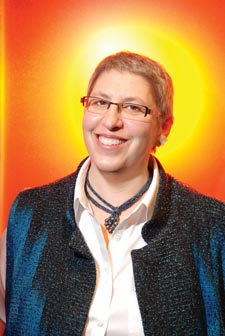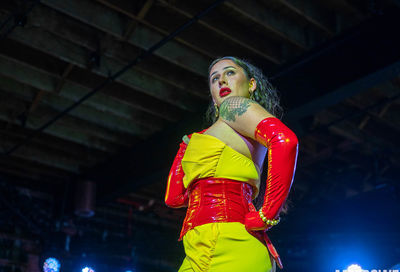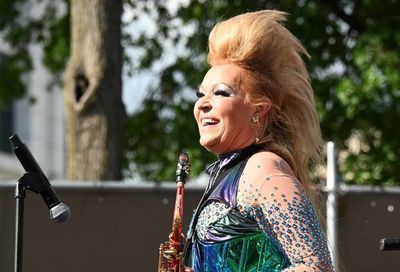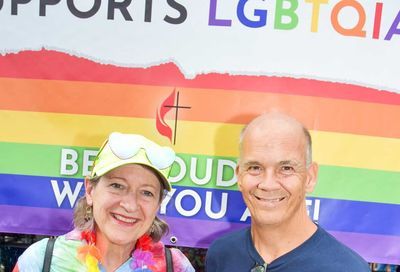Calman's Calling
Leslie Calman leads the charge as Mautner Project marks 20 years of fighting for lesbian health
New York’s loss is Washington’s gain. Although, it’s not as if New York has given up Leslie Calman completely. The political science Ph.D. returns one weekend a month to run her beloved book group Women’s Cultures, Women’s Lives.

Leslie Calman
(Photo by Todd Franson)
At 19, her book group is nearly as old as Mautner Project: The National Lesbian Health Organization, which will mark 20 years of fighting for lesbian health — and supporting those affected by illness — on March 20. The theme of the gala is “20/20: Perfect Vision.”
“We talk about Mary-Helen Mautner’s vision,” says Calman, Mautner’s executive director since January 2008. “We have a founding story that’s not myth, but reality. Mary-Helen Mautner was an activist, along with her partner, Susan Hester. They were both feminist, lesbian, radical activists. Mary-Helen had her second bout with breast cancer, and about three weeks before she died, she actually took out a piece of paper and wrote an outline of what an organization might look like where lesbians would help lesbians with breast cancer. That was the founding document, in effect, of Mautner Project. It started as an organization to help lesbians who were ill with breast cancer.”
While Mautner Project has held to that role over the decades — helping clients navigate the health care system, making referrals, or offering bereavement groups when that is the only way left to help — the organization has grown into so much more. There is the Spirit Health Education (S.H.E.) Circle holistic health education program for African-American women, or the Removing the Barriers program that has trained thousands of health professionals nationwide in lesbian cultural competency. There are smoking-cessation efforts and health research.
And there are plans to grow Mautner Project further. Sitting with Calman, 57, it’s hard to deny she has the fortitude to lead Mautner into the future. On first impression, Calman is cheery. But it’s not long before you sense that the welcome cheeriness is fortified with the kind of organic, timeless strength that might accompany an orca as she swims with her newborn calf, or by a 19th century sweatshop worker who realizes the status quo is not good enough, no matter her place and time.
Calman’s history is evidence of her strength. About six years ago, she uprooted herself after decades in New York City and led her then-teen son, Ben, and her mother, Isobel, to Washington to make a new home with her partner, Jane Gruenebaum. Calman took to Washington and started growing new roots, which now run from that home in Woodley Park, back to New York, and through Mautner Project.
METRO WEEKLY: I know you have New York history, but were you born there?
LESLIE CALMAN: I was born and grew up on Long Island — painfully suburban. For years, my idea of being out of the closet was admitting that I grew up in suburbia. But I moved to New York City to go to Barnard College, which was my home for over 20 years. I lived on the Upper West Side near Barnard and Columbia University from 1970 to 2004. So, honey, I’m a New Yawkah.
I got a Ph.D. in political science from Columbia, even though I had told my friends I wouldn’t go to Columbia. But they gave me a full fellowship, and that settled that. Then I went back to teach at Barnard for the next 17 years. What I taught, my specialty, was a class called Modern Political Movements. After 17 years of teaching about political and social change, I thought it was time to go do something. [Laughs.] I was just feeling an itch and wanted to do something “real world.” I was lucky enough to get a job at [National Organization for Women] Legal Defense and Education Fund, where I was executive vice president, which means I was the chief administrator for a bunch of lawyers. I did that for seven years. Then I moved to Washington, not for a job, but for love. I moved to Washington for Jane, who lived here. We discussed whether she would move to New York, or whether Ben and I — and my mother, whose 92nd birthday is today — would move to Washington. To Jane’s, I think continuing, shock, I said, “We’ll do it. We’ll move to Washington.” We waited till Ben finished eighth grade so he could start high school here, and we made the big move.
MW: May I ask how you and Jane met?
CALMAN: Now there’s a lesbian novel. Jane and I met in graduate school when I was 25 years old. We were one of those high-drama lesbian couples: on again, off again, drama, drama, drama. We broke up. Definitively. Jane moved to Washington for a job and for 17 years we did not speak to each other. I met somebody in New York and she met somebody here. We each had these long relationships.
Then Jane and I met at a conference. Thank God for the nonprofit sector. We’d ironed out a lot of personal kinks along the way, each of us. We were both mature grownups in ways we weren’t back when we were 25. It was sort of surprising how sane we both had become.
To make a long story short, we ended up breaking up with our respective spouses — not really for each other, but independently. We started courting up and down the New Jersey Turnpike. Somewhere around year two, we started talking about who would move where. We decided that living in a house in Woodley Park was better for us than a house in New York. Frankly, it was sort of a sign of my deep commitment to Jane: the sacrifice of leaving New York to move to Washington. [Laughs.]
MW: So no more drama for you and Jane?
CALMAN: No, very little drama. At Mautner Project it’s like a joke that I say we run a “no-drama shop.” I put up with no drama. Few meetings and no drama, those are my rules. [Laughs.]
MW: Speaking of reunions, was it the same with leaving academia for activism? Was there any activism in your youth?
CALMAN: Oh, yeah. Even on Long Island it was possible. I was in high school from 1967 to ’70 and did anti-war marches. I was 10 years too young to be a Freedom Rider, but I was one of 20 kids who left our high school the day Martin Luther King Jr. was shot and walked to the nearest church and had a service. My original professional intention was to be a civil-rights lawyer. That was my goal.
When I was a sophomore in Barnard in 1972, it was the last of the great, big “shut down Columbia” things. These were against the Vietnam War, the mining of Haiphong Harbor and the invasion of Cambodia — facts that will mean little to people under the age of 50, I suspect. In 1972 we shut down Barnard, which we were very proud of because it was the first time Barnard had been shut down, as opposed to Columbia. I basically didn’t go to class for three weeks because I was busy shutting down buildings.
My parents, at first, were quite supportive. Then, after about two-and-a-half weeks, I started getting these phone calls: “So, should we pay your tuition next year, or are you not going to school?” But they were really very good about it. It took a lot of “incompletes” from, I have to say, very sympathetic faculty members who were very cooperative with their striking students, because they were on our side too.
MW: Who are your political heroes?
CALMAN: Ooh, that’s an interesting question. This is going to be so weird: Emma Goldman. Because she was funny and smart — and an anarchist. [Laughs.] I like feisty, smart women. Gertrude Stein. Virginia Woolf. You may have been expecting me to say Gandhi or Martin Luther King. Intellectually and academically, I’m actually a mini-expert in Gandhi and nonviolent stuff. I not that I don’t have admiration for them, but the people who got into my soul were the women of earlier generations who were feisty and funny and smart.
MW: While your parents were supportive of your activism, how did they feel about you being gay? Did you have a specific “coming out” to your parents as a lesbian?
CALMAN: I didn’t really come out till I was 30. Of course, my mother knew from the time I was about 12. I wish she’d told me, because it would’ve been helpful.
What I said to my parents was, “The good news is that I’m marrying a banker. The bad news is she’s not Jewish.”
My dad clearly had trouble with it personally, but didn’t manifest that. I could just see he was personally struggling with it, but he was completely gracious and then completely bought in. They were wonderful in-laws and good grandparents when the time came.
I used to have this discussion with my students. I taught at Barnard for a long time, so I had many students who would come to me and tell me they were going home some weekend to come out to their parents. I wouldn’t always say, “Good for you! That’s great!” I would say, “Are you sure? Is there a need? Are you sure you want to do this? Because the older you get, the easier it will be.” When your 25-year-old or 35-year-old kid comes out to you, you can’t say, “Are you sure this isn’t a phase?” When you’re 17, that’s what you’re going to hear. Maybe less so now, but certainly 20 or 30 years ago. Even with good parents, caring, loving parents. And occasionally it was just a phase they were going through. I did have a few students who went through the whole drama of coming out to their parents only to eventually decide they weren’t gay or lesbian after all.
By the time I came out to my parents, at a ripe old age, there wasn’t a whole lot they could say about it in terms of trying to change my decision.
MW: Coming out as a lesbian nearly 30 years ago was fairly pioneering, but not so much as being a lesbian mom circa 1990, I’m guessing.
CALMAN: The first issue was getting pregnant. It took me quite a while to get pregnant, as it turned out. I think Ben would be comfortable with me saying that we used donor insemination from an unknown donor. I kept this part secret from my parents, who would’ve been calling every 10 minutes. The reason I didn’t tell people is I really didn’t want those phone calls every month that asked, “How’s it going?” As it turned out, that was a good thing because it took me two years to get pregnant. There’s enough stress on you when you’re trying to get pregnant.
When I got pregnant I told my colleagues in the political science department, the older of whom were very surprised. One of my dear gay friends said, “Don’t you lesbians know anything about birth control?” [Laughs.]
MW: Your colleagues were surprised because they didn’t know you wanted a child?
CALMAN: Because nobody expected a lesbian to be pregnant. It’s fair to say I was the first out lesbian pregnant person at Barnard College. [Laughs.] So they were just surprised. It was in no way disapproval. And I am a woman of somewhat large stature, so what’s funny is nobody knew. I didn’t look pregnant; I looked fatter. When I finally let the Barnard community know, I was six months pregnant. I got an e-mail from one colleague who said, “I was so thrilled to hear you were pregnant. I thought you were just getting fatter!” [Laughs.] There was a lot of that going around.
I was given a baby shower at Barnard. This was 1990. Everyone came — the president of the college, the vice presidents. It was a very touching moment. It was about being out. It was about their acceptance, their wanting to be affirming of me, of a colleague who was an out lesbian having a baby. In 1990, it did mean people had to wrap their heads around it. I was very lucky to live in this community — Barnard College and the Upper West Side of Manhattan — where people were willing and even happy to do that. It varied in whether it took them 10 seconds or 10 minutes, but they all got there.
MW: A couple of decades later, your son is off at college and you’re the executive director of the Mautner Project. When I last interviewed you, it was shortly after Easter Spencer, a Mautner client and volunteer, attended President Obama’s health care-related address to a joint session of Congress in September 2009. Health care reform has yet to be resolved. As the E.D. of a health-related organization, what’s your take?
CALMAN: I’m a sort of “European social democrat” who thinks that government has a very important role to play in the public good, so I’m disappointed that Obama has not been able to pull this out of the hat yet. I understand the need for compromise, so I’m not frantic over the fact that this bill — should it ever get through — will not be what I hoped it would be, but I sure as hell hope it’s something. Our community and the country as a whole need a better health care system that’s more affordable for more people.
And I do believe health care is a right. Plenty of people in this country don’t have it, and a number of the people in this country who don’t have it are lesbians.
MW: Obviously, being president is no guarantee of getting what you want. But, hypothetically, what would “absolute dictator” Calman’s health care look like?
CALMAN: We would look more like Canada. We’d have public health care. We’d have Medicare for everybody. But I recognize I’m to the left of most Americans on the issue. That’s why I can accept compromise. But we’re living in a political environment where there is no middle, which is making life very difficult. At this point, I feel the Democrats should take the bull by the horns and do reconciliation and get what they can.
MW: Though you’ve got an impressive background — you’re a Ph.D., after all — you must be gaining new insights into health care at Mautner.
CALMAN: I actually have learned a lot about lesbian health and lesbian health care since taking this position. One of the things I have learned is that — as you may have picked up, I’m a fairly feisty and direct person — a major health issue for lesbians is an unwillingness to be feisty and direct with health care providers. People have so often had experiences that left them feeling stigmatized and discriminated against, so they either don’t give vital information or they just don’t go at all.
I’m lucky enough to be educated and come from a middle-class background, so I have always had medical options. If I come up against a doctor I don’t like, I go to another doctor. Not everybody has that set of options. It’s not just a matter of personality — it’s also a matter of financial ability to say, “See ya, I’m moving on.”
One of the things Mautner Project is adamant about is educating our own community about what they need, how to empower themselves, what they need to do for themselves, and educating the medical-provider community about us and our issues. It’s a two-way street.
MW: Shortly after you took the position, you said you were hoping to double Mautner’s budget.
CALMAN: I still am. But we went the other direction as the economy went south. We have managed to stay afloat, keeping our programs pretty much intact by staff working really hard. I’m beginning to see that the tide may be turning. But keeping level was kind of the new “up” last year. If you could just sort of stay level, you felt like you were doing just fine.
My very dedicated board and I often lament that we spend most of our time talking about fundraising instead of program development. But we did actually do some strategic planning, did lay out some new programs. We just got a big grant from the District of Columbia that I’m very happy about, which is for working on lesbian obesity. It’s a big issue for women. It’s an even bigger issue — pardon the pun — for lesbians than for heterosexual women, [according to] the little bit of data we have. We’re working with a researcher at Vanderbilt University who’s a nurse and a Ph.D., Sarah Fogel. She’s a lesbian and one of the few researchers who has done any work at all on this issue. She’s written into the grant is going to be working with us throughout.
Something a lot of people don’t know about Mautner Project is we’ve long done work in partnership with academics. One thing we haven’t done enough of — that I’m going to try to change — is publish the results of the work in academic journals and the kind of places that get other doctors, nurses and academics reading. Mautner Project has done wonderful things over the years, but not published them. That means we’re not as well known as we ought to be in those circles. There is a field of lesbian and gay health researchers — it’s easy to know all of them. [Laughs.] There aren’t that many, but there are some. And that’s how knowledge gets spread and then amplified. You’ve got to get [the research] out of the house.
There are certainly areas we want to do more in and that we’ve targeted for sooner rather than later. Elder care is one, which we don’t yet have funding for. We would love to expand into the Latina community — that’s an area that cries out for research and for work. We’d like to do more with youth.
MW: Looking at youth, I’m reminded of all the controversy about vaccinating girls against HPV. Are STDs a major issue for lesbians? The conventional wisdom is gay men have all this sex and suffer STDs, while lesbians have some “pure” form of sex and nothing is communicable.
CALMAN: Pure as the driven snow. [Laughs.] The truth is we don’t know. There is insufficient research on the prevalence of STDs in the lesbian community or the bisexual women’s community. There just isn’t the research. One knows anecdotally that there are lesbians with STDs.
A huge issue in the lesbian health arena or the gay health arena is inadequacy of research. We are truly invisible in much of the research community. We’re invisible in the Census. There are some wonderful demographers who try to crunch the numbers to find same-sex couples, but that would be like looking at the heterosexual population only by looking at married people — obviously you’re going to miss a whole lot.
So the answer to a lot of questions about what exists and what needs to be done is: “We don’t know.” A lot of the advocacy work that goes on in the wonderful National Coalition for LGBT Health — that I sit on the board of, that Rebecca Fox is the director of — is to say count us. Literally, count us.
MW: With the gala coming up, is there something special about marking 20 years of the Mautner’s Project work? Is it just a number?
CALMAN: It is a number. But it’s a remarkable number for an organization that started as a group of volunteers getting together with a vision. And that has professionalized, survived and continues to have those roots in the volunteer community. We have 60 volunteers who work with clients who have cancer. We have another 50 or so volunteers who help out at events and fundraising. That’s our deep roots in the Washington, D.C., community. Even as we venture forth and do trainings around the country, D.C. has really been the main supporter of this organization.
MW: If I should understand anything about health disparities for lesbians, what would that be?
CALMAN: Most of the health disparities are socially created. There’s nothing about being a lesbian, per se, that’s unhealthy. There are things that are either created by stress of stigma and discrimination, or, I suspect — and this is hypothetical because we don’t have the research — part of it is an identification thing. If all the lesbians smoke and you’re a young lesbian, you’re going to smoke, too. The obesity is partly about stress and stigma. It may partly be about rejecting certain heterosexual norms. And the biggest lesbian health disparity is not getting medical care. Part of that is fear of being stigmatized. Part of it is lesbians, as a group, have less health insurance than other folks, because the best predictor, if you’re a woman, for if you have health insurance is if you’re married because you have your husband’s health insurance. So lesbians are under-insured.
Lesbian health issues are not because of lesbian bodies. It’s because of these various social factors that create disparities.
For more information about “20/20: Perfect Vision,” Mautner Project’s 20th Anniversary Gala, Saturday, March 20, at the Omni Shoreham Hotel, 2500 Calvert St. NW, call 202-332-5536 or visit gala.mautnerproject.org.
Support Metro Weekly’s Journalism
These are challenging times for news organizations. And yet it’s crucial we stay active and provide vital resources and information to both our local readers and the world. So won’t you please take a moment and consider supporting Metro Weekly with a membership? For as little as $5 a month, you can help ensure Metro Weekly magazine and MetroWeekly.com remain free, viable resources as we provide the best, most diverse, culturally-resonant LGBTQ coverage in both the D.C. region and around the world. Memberships come with exclusive perks and discounts, your own personal digital delivery of each week’s magazine (and an archive), access to our Member's Lounge when it launches this fall, and exclusive members-only items like Metro Weekly Membership Mugs and Tote Bags! Check out all our membership levels here and please join us today!























